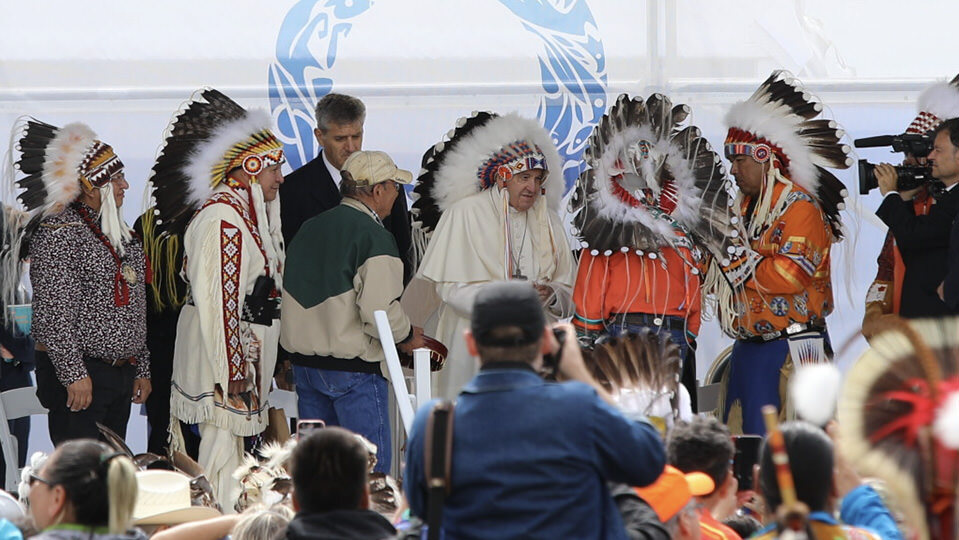

Two years on from Pope’s historic visit, CCCB releases letter recognizing accomplishments and envisioning a path forward
Matthew Neugebauer
Thursday, July 25, 2024

Pope Francis encounters Indigenous leaders during his Penitential Pilgrimage to Canada in 2022.
Yesterday morning, the Canadian Conference of Catholic Bishops (CCCB) released "From strong words to meaningful partnership." The letter commemorates the second anniversary of Pope Francis' historic Penitential Pilgrimage and apology on behalf of Church leaders for the horror of the residential schools. The bishops write:
We find ourselves reflecting on the profound sorrow Pope Francis expressed for the devastating effects of the residential school system on Indigenous communities, and on the journey of reconciliation and healing we have embarked upon together.The letter lists a trio of major steps taken by the CCCB in the last two years towards deeper reconciliation with and support for Indigenous communities in Canada. The accompanying press release summarized them succinctly:
-
- Financial Support for Indigenous Projects through the Indigenous Reconciliation Fund (IRF): “To date, the IRF has raised more than $15 million, and…has approved 166 projects determined in collaboration with First Nations, Métis and Inuit partners across the country.” The main letter states that these projects have focused on “healing and reconciliation,... the revitalization of cultures and languages, education and building of communities, as well as dialogues for promoting spiritualities.”
- Transparent access to records including “a set of Guidelines to assist dioceses in developing policies for documentation and access to relevant records, including mission, sacramental and burial records” of Indigenous institutions and communities.
- Continuing to dialogue with First Nations, Inuit, and Métis Peoples through new “structures within the CCCB to support local and national dialogues to foster greater understanding of Indigenous cultural, linguistic, and spiritual traditions and values.”
"Let us keep in mind that this deep desire for truth and transparency resides first with Indigenous communities and residential school survivors. Decisions to study this history are best made locally by Indigenous leaders, who have the most direct understanding of the needs of their respective communities."Similarly, the letter recalls that the above-mentioned Guidelines for access and documenting records is intended to undergird this work of truth-telling, rather than direct it or needlessly restrict it. It concludes on a rather synodal note, one that is rooted in Pope Francis' oft-repeated themes of mutual accompaniment and encounter:
"The way of reconciliation and hope is one that must be walked together. That is why we shall continue to listen to and support survivors and Indigenous communities during this journey. We are grateful to all who accompany us on this path of healing and reconciliation."Salt + Light Media has produced two original documentaries on the backdrop to Pope Francis' Visit to Canada, both of which are available now on Salt + Light Plus. The award-winning "Walking Together" accompanies Elders and bishops to Rome to ask the pope to make his historic apology on Indigenous and Canadian soil. The follow-up feature, "Walking Together: Into One Beat" journeys with those preparing for and responding to his visit in 2022. Both films tell movingly personal stories of suffering, reconciliation, and hope.
Related Articles:
>>













